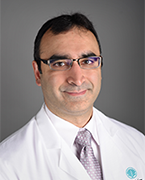Residency Programs
Chairmans Corner

Welcome, and congratulations on your decision to pursue Physical Medicine & Rehabilitation (PM&R) as your specialty of choice!
There is no better time than now to be starting your journey in medicine. And there’s no better place to do it than within the Department of PM&R here at Carolinas Medical Center and the Wake Forest University School of Medicine – Charlotte. The academic and clinical experiences in Charlotte are second to none, and the opportunity to experience rehabilitation at the cutting edge will provide unique and exciting opportunities to help advance your career.
It is my honor to serve as Chair and Specialty Medical Director for PM&R. Our mission is to advance access to and recognition of physiatry within our communities and organization. And I can think of no better team than ours to do it. With clinical expertise in musculoskeletal, neurological and medical conditions, we aim to address physical and cognitive impairments, leading to improvements in function and quality of life. Leveraging the resources of Atrium and Advocate Health and working with nationally renowned organizations including Carolinas Rehabilitation and the David L. Conlan Center, Levine Children’s Hospital, Levine Cancer and Musculoskeletal Institute, our group is well positioned to help individuals accomplish their rehabilitation goals.
Thank you for considering our program, and I hope we can support your training in the Department of PM&R at Carolinas Medical Center and the Wake Forest University School of Medicine-Charlotte. With our long-standing tradition of excellence in clinical work, education and research, you will have a special opportunity to explore the areas of physiatry that you find most interesting. Your potential is unlimited, and we look forward to supporting you on your way!
Sincerely,
Vishwa S. Raj, M.D.
Chair and Specialty Medical Director, Department of Physical Medicine and Rehabilitation
Medical Director, Carolinas Rehabilitation
Chief of Cancer Rehabilitation, Levine Cancer Institute
Professor, Wake Forest University School of Medicine

